Introduction by Marc- We get to welcome a new staff member to FBR today. Heath will be writing some editorials and reviews for us in the future. Many Dragonball Z fans will know him as Hujio, from one of the premiere American DBZ sites, Kanzentai. For his first article he wrote up a little history of DBZ DVDs, including some of his personal thoughts on the matter. I actually asked him to do this prior to his first review because a lot of the more casual DBZ fans out there don’t get why the announcement of the American ‘Dragon Boxes’ are such a big deal to many of the more hardcore DBZ lovers. So I’ll pass the dragonball over to Heath for his initial post at FBR.
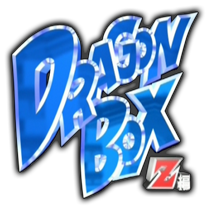
The general history of DragonBall Z in the United States is a long, storied, and overly complicated one. The DVD releases alone are so complex that it’s hard for even avid fans to keep track of them all, let alone a casual fan. We’ve seen both censored and uncensored releases, multiple distributors, multiple voice casts, varying music in each release, varying scripts, canceled releases, and much more. Overall there have been three releases and somewhere amongst them all, you could piece together some sort of a coherent release. Let’s take a step back in time to relive the last decade and a half so we can fully understand what an enormous feat it is to hear that we’ll now be seeing a release of the Japanese “Dragon Boxes”.
In 1994, FUNimation Productions acquired the rights to dub the DragonBall TV series in English, but after little success, the dubbing was scratched. However, FUNimation saw the potential in DragonBall’s sequel, DragonBall Z, which had just finished airing in Japan. They immediately began dubbing the series with the well-known Ocean Group voice cast, and in 1996 the first dubbed episode of DragonBall Z aired on U.S. television. FUNimation initially dubbed a total of 53 episodes, comprised of the first 67 original Japanese episodes. Due to DragonBall’s massive success in Japan, it already had quite a following in North America, and many of these fans were not too pleased with this editing of their beloved anime series. Unfortunately, there was not much FUNimation could do, as the censoring and editing were being mandated by their distributer, Saban Entertainment. Fans were also upset with some of the liberties FUNimation had taken with the series, which included altering dialogue, replacing the original music, and creating their own opening and endings for the series.
Following the completion of the first 53 episodes, FUNimation signed an agreement with Pioneer Home Entertainment to release these episodes on VHS and DVD. These releases came with a dub-only audio track and the episodes were presented as they had been on TV, edited and censored. Meanwhile, they began working in conjunction with Pioneer on dubbing the first three DragonBall Z movies. This was also the last time that the Ocean Group would be involved as FUNimation soon switched over to an in-house dubbing cast. At this point, DragonBall Z hadn’t really found its place and was still only really being followed by avid fans. But that was all about to change!

In 1998, FUNimation struck a deal with the popular cable television network Cartoon Network, who agreed to air one episode of FUNimation’s dub of DragonBall Z everyday during their afternoon Toonami block. This agreement catapulted DragonBall Z into thousands of homes across the country in August 1998, and as it had done years earlier in Japan, it became a smash hit. The popularity of the series exploded almost over night and was no longer just for avid fans in North America. Seeing a new larger market in the casual fan, FUNimation extended their deal with Cartoon Network and eventually began dubbing more episodes for them to air.
FUNimation dubbed 50 additional episodes in 1999 in both “uncut” and TV-edited versions. However, there was still an outcry from fans that their dub of the series was not matching up to the original Japanese version in many respects. In response, FUNimation, who was also now distributing the series, began releasing bilingual DVDs which included the English dub and an unaltered version of the original Japanese audio track with subtitles. The overall quality of these first DVDs left much to be desired, in both video quality and technical issues. Following this, the remainder of the series and movies were dubbed using FUNimation’s in-house Texas voice cast, aired on Cartoon Network, and released on bilingual DVDs. The quality of DVDs improved over time and by 2001, it appeared that FUNimation had finally gotten the hang of creating and distributing their own DVDs.

By the end of 2005, FUNimation had finished releasing the “entire” dubbed series on DVD, although out of order. The majority of the “Cell Games” discs and the entire “Great Saiyaman” arc were skipped and not released until FUNimation had neared the end of the series. FUNimation had also stuck with an episode numbering system based on the episode edits. When it was all said and done, they had dubbed and released 276 episodes, as opposed to the original 291 episodes, and all thirteen DragonBall Z movies using two voice casts and three distribution companies (including themselves). However, only the last 223 episodes and 10 movies were available bilingually and uncut, and the 14 episodes cut from the first two seasons were left undubbed and unreleased. In addition, none of the original credits or next episode previews were included, although this is really no fault on FUNimation’s part, as they were never entirely given them by Toei.
With DragonBall Z being such a success, FUNimation decided to return to where it all began and dubbed DragonBall. With the first two of the three series completed, FUNimation decided to complete the trilogy by dubbing DragonBall GT. Of course, GT and FUNimation is a whole other story in and of itself, so we’ll save that for another day. To most fans excitement, FUNimation announced they would be returning to redub the first two seasons of DragonBall Z in their entirety (all 67 original episodes) with their in-house voice cast. This release was being touted as the “Ultimate Uncut Edition” and would also be aired uncut on Cartoon Network. The first DVD was released in April 2005, but the series soon mysteriously disappeared following the ninth volume which was the second volume of the second box set (stopping after episode 27). Fans were left in limbo as they waited for word from FUNimation, who had silently canceled the “Ultimate Uncut Edition” releases, as to whether they would be able to fill the rest of their second “Ultimate Uncut Edition” box set.
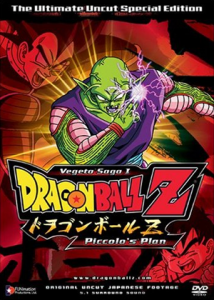
Months went by and there was no word from FUNimation. Finally forced to make a comment due to images and listings being leaked onto the internet, FUNimation announced they would be releasing season box sets. They also announced this would be a complete remastering of the series which would be presented in a widescreen format. Despite FUNimation’s claims, the frames were not fully extended to the side and the sets would indeed be cropped (missing approximately 20% of its vertical resolution while only gaining approximately 5% of its horizontal resolution). It was also found that the sets were not being remastered frame-by-frame and the colors were being adjusted. However, there was one bright side to the release; you would be able to select from multiple audio tracks, meaning for the first time FUNimation’s dubbed track could be played with the original Japanese score.
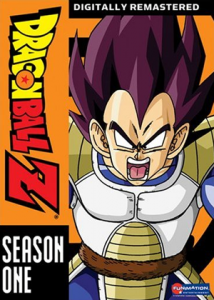
This third release of the series marked the first time it had ever received a “consistent” release from beginning to end in North America. This release also meant that certain episodes would only be available in widescreen, making it impossible to own the entire series in its original 4:3 fullscreen aspect ratio. With that said, this release ultimately divided the fandom in North America with so many clashing viewpoints about the release. The more casual fan ate them up for obvious reasons; they were cheap and the releases covered the entire series. The more avid fans had been, for the most part, supporting FUNimation and the series from the very beginning and after getting so close to having a decent release like the “Ultimate Uncut Edition” sets, they felt offended and betrayed. They had been waiting for over a decade for a consistent release of the series, only to get a cheaply produced cropped version of a show they loved so much.
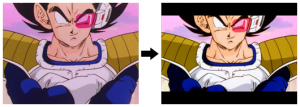
With one fell swoop, FUNimation had alienated an entire market for the series. To this day, it still amazes most avid fans that the series that helped FUNimation grow to be one of the most successful Japanese animation distribution companies in the United States could never get a proper release. So, many of these fans dropped their already dwindling support for FUNimation and turned to other countries to complete their DragonBall DVD collections. One such country was Japan, the birthplace of the series.
Beginning in 2003, Toei, in cooperation with the DVD manufacturing company Pony Canyon, began releasing a series of 5 fully-remastered box sets in Japan covering the entirety of the TV series and movies, which were dubbed the “Dragon Boxes”. These box sets were a true frame-by-frame remastering from the original 16mm film reels, as opposed to the multi-generational copies that FUNimation used for their “remastering”. Toei’s digital remastering process involved carefully removing all damage from the film, re-aligning frames to remove “jitter”, and since the original film reels were used as the source material, additional footage around the edges that had been lost was restored. This gave fans a perfectly clean picture, yet never compromised the integrity of the actual animation. Finally, the episodes were presented in their entirety from start to finish, as they had originally aired on TV. This included the complete opening credits, ending credits, and next episode previews.
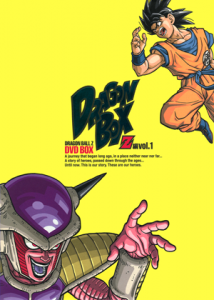
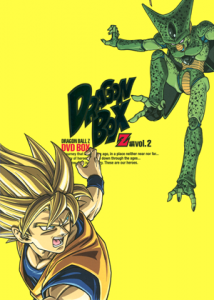
Unfortunately, the “Dragon Boxes” were limited edition in the truest sense of the word. An order start date would be announced several months in advance, as well as an order deadline. The ordering windows were typically several months in length, and all manufacturing of the box sets were based solely on the number of orders received. In other words, they only made enough boxes to satisfy the orders made within the given timelines, after which point production on the boxes ended indefinitely. Because of this, many fans in the North American market never got the chance to get the “Dragon Boxes” for themselves. Others simply couldn’t afford the steep prices, as the entire Z series combined cost roughly $2,000. In addition, the “Dragon Boxes” were truly meant for the Japanese market, as they contained only the Japanese audio track and had no subtitles.
This brings us full circle to the present…
FUNimation recently announced at their industry panel at the Otakon anime convention that they would be releasing the Japanese “Dragon Box” sets for the DragonBall Z TV series. It appears that FUNimation is reaching out to the avid fans they had alienated all those years ago. In fact you don’t even have to speculate, since it was made perfectly clear by their initial announcement, in which FUNimation rep Adam Sheehan stated “we (FUNimation) didn’t change a damn thing”, “they (Toei) did it perfect, they did it right”, “we’re pushing this for the hardcore fans… this isn’t for the casual DBZ watcher”, and “you’re getting this all just exactly the way you wanted to”. Even their trailer referred to the “Dragon Boxes” as the definitive presentation for the series. They even made a huge point that the boxes will be in a 4:3 fullscreen aspect ratio. Hell, FUNimation’s “Dragon Boxes” will default to the Japanese language track with the English track as the secondary audio track. They are also slated to come with 80 page booklets, the original box cover art, complete opening and ending credits, the original next episode previews, and subtitles.
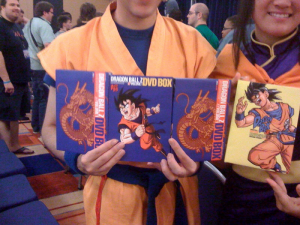
This is what makes this release so special to so many fans. Fans that have been waiting for something like this for over 15 years. Fans that have poured thousands of hours and dollars into the series. Some, like myself, can’t even put into words how this feels. However, there are still numerous grumblings across the internet after this announcement, showing just how much damage FUNimation really did over the course of more than a decade. Some fans still don’t know what to think, because for so long, there was nothing to think but bad thoughts about any North American release of DragonBall Z. Even after this announcement, most avid fans are still hesitant to throw their support behind FUNimation. Until I hold one of FUNimation’s “Dragon Boxes” in my own two hands and see it for myself, I’ll still find myself thinking, “What will FUNimation do to screw things up this time?”
Heath Cutler (Hujio) runs Kanzentai, one of the top American reference sites for Dragonball Z related material.
